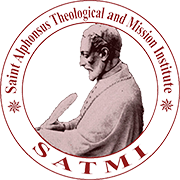Goals of Theological Formation
The Goals of Theological Formation at SATMI
The St. Alphonsus Theological and Mission Institute Foundation Inc., emphasizes the formation of missionaries who are theologically, missiologically, and pastorally competent. The students are not only taught theology but also how to theologize in the context of the contemporary world situation (socio-economic, political, and cultural). The process of theological formation is aimed at developing the habit of study and theological reflection which they will continue for the rest of their lives.
In particular, the St. Alphonsus Theological and Mission Institute aims to form committed missionaries who are capable of:
- Forming and animating Christian communities
- Exercising pastoral leadership over mission teams, parishes and communities
- Proclaiming prophetically the Word of God
- Being sensitive to cultural differences and religious traditions of the people they encounter.
- Presiding over liturgical/sacramental celebrations
- Working for social transformation
- Engaging in ecumenical dialogue as well as dialogue with those without religious affiliation
- Crossing borders of religions in the spirit of dialogue and silent witness to the plentiful redemption offered for all
The Pedagogical Orientation at SATMI
The St. Alphonsus Theological and Mission Institute Foundation Inc., stresses a participative-dialogical, pastoral, and mission-oriented program. The pedagogy does not solely rely on the lecture/magisterial method but also fosters critical thinking. The students actively participate in the learning process through research work, readings, class discussion, and reporting. The use of modern technology in preparation for future ministry is encouraged.
Integral to the Program is the crossing of borders component. This is realized in the mandatory break for Redemptorist students (and encouraged for members of other Religious Congregations) from academic studies during the third year wherein students are asked to live and undertake pastoral ministry in a cultural setting different from their own. This exposure has two objectives:
- to gauge the capacity of students in the theological skills of faith-life reflection, and
- to ground them in an experience of crossing borders of religion, culture, and secular ideologies.
The use of contemporary pedagogical methodology is encouraged. The Institute is also developing a theology program that is contextualized and inculturated in the Asian context while at the same time taking into consideration theological developments emerging in other parts of the world.
